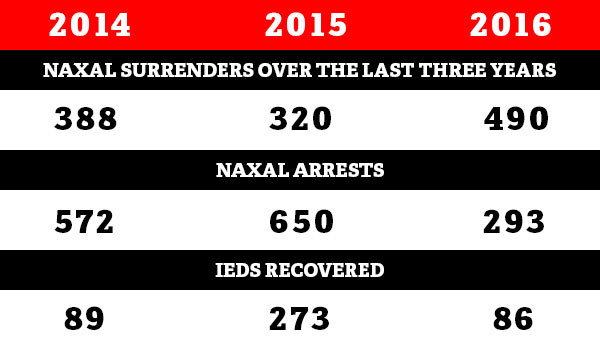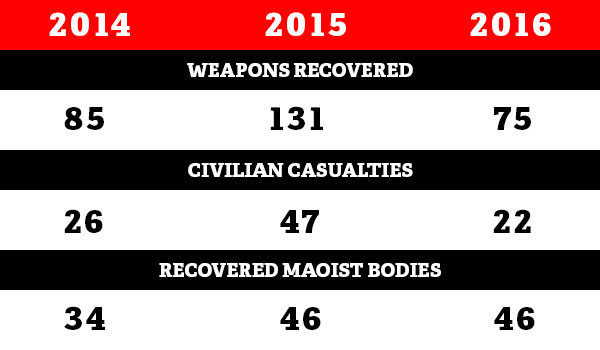Former rebels or police captives? 'Surrendered Naxals' narrate their ordeal

If the 'Naxals' who police claims are surrendering before them, almost on a daily basis, were actual cadres, Naxalism should have been totally wiped off from Bastar.
This Saturday, when the most number of Naxals (122) surrendered in a single day, ought to have been a historical day in Chhattisgarh's anti-Maoist operations and should have been celebrated by the state officials and ministers.
But almost nobody, including Chhattisgarh's Special DG (Anti Naxal Operations), knows exactly how many of those whose 'surrender' police proudly boast of, are actually Naxals.

Another notable fact is the recovery of arms from surrendered Naxals, on which the state puts a high price. Every surrendered Naxal is given additional compensation for surrendering with their arms, and it is on basis of their recovered arms that counter-insurgency's success is measured.

From the 122 'Naxals' who 'surrendered' on Saturday, police just recovered three locally made 'bharmaar' rifles. The Naxals use far more sophisticated weapons than what the police have recovered.
And Naxals aren't finding their inspiration to surrender - the figures for first four months of 2016 have already set a historic record - because of a more lenient surrender policy.
Chhattisgarh's transfer policy hadn't changed in last three years.
According to intel inputs of various anti-Naxal forces in the area, the strength of Naxal cadre in Bastar is estimated to be between 1000 to 4000. As per police's claims 809 Naxals have surrendered before it in the last one-and-a-half years. But the police has not been able to retake a single village from Maoist dominated areas all this while. So what explains the discrepancy?
It appears that the police is spreading misinformation about the surrenders. Conversations with several 'surrendered Naxals' in Bastar punch holes in the police narrative.
No high profile surrenders
For all their publicity about the 'dents' they're making in Maoist ranks, Chhattisgarh police does not have a single high-profile surrender or arrest to show. Even among the mass surrender that happened on Saturday in Sukma's Dornapal, police itself admitted that only three carried the minimum reward - Rs 1,00,000 - on their heads.
Also read- Bastar cop: Samajik Ekta Manch is our version of guerrilla warfare
DM Awasthi, Chhattisgarh's Special DG (Anti Naxal Operations), admitted that while they had claimed and publicised surrender of 122 Naxals, they had no idea of actual the number of Naxal cadres among them.
"See when a lot of Naxals and their sympathisers want to surrender we welcome them. After their surrender a government appointed committee looks into their claims and their history and then deals with them appropriately. Out of these 120 who are proper Naxals is difficult to say at the moment," Awasthi said.
"After" here is the operative word, because police has so rigged the system that any scrutiny of the 'surrendered Naxals' happens only after their 'surrender' is publicised, after they're made to sign affidavits (by which the signatories admit that they were former Naxals who now want to join mainstream movement).
And doesn't publicising stories and photographs of these 'Naxals', of whose culpability the state is not even aware of, endanger their lives and put them on the hit-list of Naxal extremists? "Quite possibly," Awasthi admits.
When Sukma SP, D Shrawan, who oversaw 122 'Naxal surrenders' was asked about the criticism levelled at his department because of the fake surrenders he said, "We are not bothered about any criticism. We do our job. Let people say whatever they want. We don't listen to everyone."
The terms of 'surrender'
Catch spoke to a few 'surrendered Naxals' from several villages in Bastar and Sukma, some of who couldn't speak Hindi or English, to find out how exactly did they end up surrendering before the police.
Read- Cannon fodder: how police is using child spies against Naxals in Bastar
We have put together some of the recorded conversations and put it together here.
(Names and locations of these villages have been changed to protect their identities)
Three common phenomena in all cases was that none of them knew what 'surrender' actually meant. And all of them had had become homeless. And all of them were threatened to surrender.
Read more- Smoke signal: is IAF launching an air offensive against Naxals in Bastar?
As soon as they realised that whatever surrender meant, it angered local Naxals who were now looking out to murder them. They've run away from their native villages and are now living near CRPF or police camps, doing odd jobs for survival.
Goyam Idma of Mukaram says he was threatened with dire consequences if he did not surrender to the police.
"My sarpanch came to me and said that you have to come and surrender to the police. The sarpanch had said that if you don't surrender, the police will come and arrest you, put you in jail and beat you everyday."
Roop Mahal of Kanker Lanka village says that he was dragged to the nearest police station and he was told that his name was on a 'hit-list' which only the police had access to.
"They forcibly took me to the police station and accused me of cooperating with the Naxals, I still don't know what I was being accused of. They have given me a Rs 10,000 cheque and have promised me a home. But that hasn't come. The only income that I had in my village, I cannot earn because I've had to run away from it."
Lakma Sori of Gogunda was told that his name was on a 'wanted' list. Only on the condition that he surrendered would his name be erased from the list. He was also offered a job and a house.
Sori says that even after 'surrendering' he hasn't been told if his name has been erased from that list or not. He was asked what does he think he gained from surrendering to the police. "Nothing," he said after thinking for a while.
Koya Madkam of Jagargunda tilled own fields until he had to 'surrender'. Two men, one of who had surrendered himself, came to his house one day and asked him to go with them to the nearest police station.
"They gave me Rs 5000 and asked me to bring more people to surrender. They don't understand that after nightfall, when they go back to their camps, there is no place for us to hide. Maoists come to our village once every week and made inquiries. I would have been hacked to death if I'd remained in my village. I've nothing left and don't know how to earn a living now."
Edited by Aditya Menon
More in Catch:
Eye to Eye 2.0: We have reached peak Taher Shah with his fantastic new video, Angel
Red Alert: pay pending NREGA wages or quit, Naxals warn MP sarpanches
Anupam Kher stopped at airport on his way to NIT Kashmir; Twitter divided
Rahul Gandhi might grow old waiting for generational change in Congress
First published: 10 April 2016, 3:21 IST





![BJP's Kapil Mishra recreates Shankar Mahadevan’s ‘Breathless’ song to highlight Delhi pollution [WATCH] BJP's Kapil Mishra recreates Shankar Mahadevan’s ‘Breathless’ song to highlight Delhi pollution [WATCH]](https://images.catchnews.com/upload/2022/11/03/kapil-mishra_240884_300x172.png)

![Anupam Kher shares pictures of his toned body on 67th birthday [MUST SEE] Anupam Kher shares pictures of his toned body on 67th birthday [MUST SEE]](https://images.catchnews.com/upload/2022/03/07/Anupam_kher_231145_300x172.jpg)






